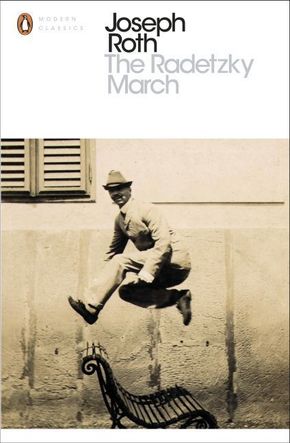
| Verlag | Penguin Books UK |
| Auflage | 2016 |
| Seiten | 368 |
| Format | 13,1 x 19,8 x 1,9 cm |
| B-format | |
| Gewicht | 276 g |
| Artikeltyp | Englisches Buch |
| Reihe | Penguin Modern Classics |
| Übersetzer | Joachim Neugroschel |
| ISBN-10 | 0141393424 |
| EAN | 9780141393421 |
| Bestell-Nr | 14139342EA |
"Aufstieg und Niedergang einer altösterreichischen Familie durch drei Generationen, die wunderbar verbunden sind mit Regierungsdauer, Glück und Ende Kaiser Franz Joseph des Ersten. Von der Schlacht von Solferino bis zum Weltkrieg schildert der Roman Glanz und Untergang des alten Österreich", so hieß es auf dem Umschlag der Erstausgabe von 1932. Roths großer Roman begründete quasi über Nacht seinen weltliterarischen Ruf: In unnachahmlicher Weise zeichnet er ein behutsames Porträt jener vergangenen Epoche, das selbst den Schwächen und Fehlern der untergehenden Monarchie liebenswürdige Züge abgewinnt, dabei aber ebenso die Sinnlosigkeit und Erstarrtheit der nahezu vollständig am Militär ausgerichteten Gesellschaft aufzeigt. Endlich wird dieser Roman nun ohne die Entstellungen der späteren Drucke in seiner ursprünglichen Gestalt wieder zugänglich: Zusätzlich und ebenso zum ersten Mal hilft ein Kommentar dem Leser, historische Details und Hintergründe genauer zu verstehen.
Strauss's Radetzky March, signature tune of one of Europe's most powerful regimes, presides over Joseph Roth's account of three generations of the Trotta family in the years preceding the Austro-Hungarian collapse in 1918. Grandfather, son and grandson are equally dependent on the empire: the first for his enoblement, the second for the civil virtues that make him a meticulous servant of an administration whose failure he can neither comprehend nor survive, the third for the family standards of conduct which he cannot attain but against which he is too enfeebled to rebel.
NEW STATESMAN BOOKS OF THE YEAR 2015
'Sublime ... it inspires a kind of evangelical cult passion among its devotees' Simon Schama
'Roth is Austria's Chekhov' William Boyd
Strauss's Radetzky March, signature tune of one of Europe's most powerful regimes, presides over Joseph Roth's account of three generations of the Trotta family in the years preceding the Austro-Hungarian collapse in 1918. Grandfather, son and grandson are equally dependent on the empire: the first for his enoblement; the second for the civil virtues that make him a meticulous servant of an administration whose failure he can neither comprehend nor survive; the third for the family standards of conduct which he cannot attain but against which he is too enfeebled to rebel.
Rezension:
Roth is Austria's Chekhov William Boyd
